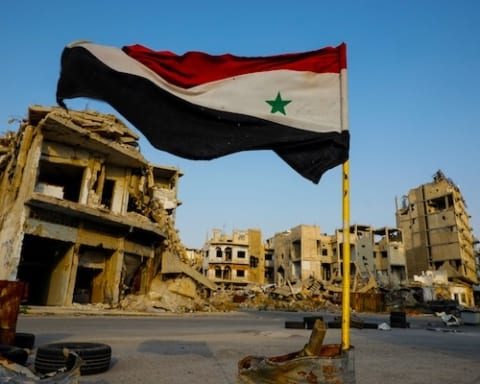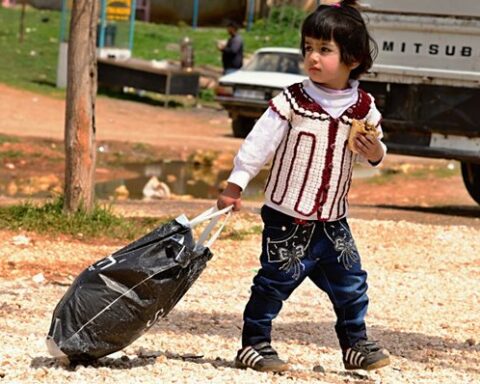Regional Low Intensity Conflicts. Covers December 19th to January 7th, 2018 – Current as of January 7th, 2018. This week’s report covers Bahrain, Egypt, Turkey, Saudi Arabia, Somalia, Yemen, UAE, Syria, and Libya.
|[For coverage on the Iranian situation, please check out David Firester’s article, “Might Imperial Overstretch be the Fate of Iran? Incipient Unrest and its Implications.“]
Gulf Cooperation Council (GCC)
The GCC is holding steadfast on the GCC-wide introduction of value-added tax (VAT) across the GCC nations as of 2018. The GCC VAT tax rate has been set at a minimum of 5%. As of January 1st, Saudi Arabia, Bahrain and the UAE are the only nation members to have introduced the new tax. The majority of other GCC members have stated that they intend to introduce VAT by the end of 2018. Oman is the noticeable exception, stating that it intends to introduce VAT by early to mid 2019. Bahrain has chosen to not introduce VAT in its entirety, for the time being. Instead Bahrain introduced a “selective tax”, also known as the “sin tax” on December 30th. The new tax subjects tobacco and energy drinks to a 100 percent tax, and other soft drinks to a 50 percent tax. The tax will be fully introduced throughout the country by January 15th, 2018.
United States in MENA
-December 18th, Washington D.C., USA
Vice President Mike Pence postponed his scheduled trip to Egypt and Israel. The decision was made in light of the December 20th vote on President Donald Trump’s tax overhaul plan. The trip is now schedule for for the week of January 14.
Bahrain
Shia government opposition groups continue to call for nationwide protests, but have so far failed to reach a critical mass with the majority of resulting public gatherings containing less than 15 people. Security forces made minor arrests relating to Shia opposition groups. The government is however reporting that a noteworthy increase of Shi’a militia and government opposition violence occured throughout 2017. This trend is expected to continue throughout 2018.
Various Shi’a affiliated militia movements continue to claim to have carried out various attacks against Bahraini security forces and installations. Few of these attacks ever receive an official confirmation from the Bahrain government. This week a handful of alleged attacks were claimed to have been carried out by a wide array of groups, including the Iran/Hezbollah affiliated Popular Resistance Brigades (Saraya al-Muqawama al-Shabiya) group.
Bahrain is quickly finding itself on the forefront of the increasingly active low intensity conflict between the Kingdom of Saudi Arabia and the Republic of Iran. Several incidents, particularly a recent surge in Improvised Explosive Device (IED) attacks, in the past few months have been attributed to Shi’a militia organizations that allegedly have direct or indirect ties to Iran.
-December 21st, al-Eker, near the villages of Nuwaidrat, Ma’ameer and the island of Sitra, Bahrain
Al-Ashtar Brigades claimed the responsibility of an attack against a police patrol earlier that same day in al-Eker. Al-Ashtar Brigades (Saraya al-Ashta) is a Shi’a militant group, which appears to have a similar structure to that of the Iran Government-sponsored group Hezbollah in Lebanon. Al-Ashtar was added to a designated terror list by Saudi Arabia, UAE, Bahrain and Egypt on June 9th, 2017. Two high-profile members of the group were added to the US terror list in March, 2017. The group has ties to Shiite political organizations in Doha, Qatar, which are believed to be fronts of the Iranian Islamic Revolutionary Guard Corps (IRGC). The IRGC are the creators, and masters, of Hezbollah in Lebanon.
The Bahrain authorities have not confirmed that an attack occurred. However, such confirmations only appear to come when the government has either positively identified the suspects, or detained them.
Egypt
Egyptian security forces continued their nationwide operations against safe houses and individuals believed to be affiliated with the Islamic State. At least 15 individuals have been detained in the past week.
Security forces continue their operations against the Muslim Brotherhood (MB), and associated organizations, throughout the country. In the past week several raids have been conducted against believed safe houses and individuals with alleged MB affiliations. According to reports, the raids resulted in at least 5 individuals killed, and a further 10 individuals detained.
Security operations continue along the Egyptian-Libyan border area with the Egyptian Air Force striking Salafist-Jihadist groups convoys crossing from Libya to Egypt. The border land, on the Libyan side, has become a haven for emerging new militia groups, including the al Qaeda-linked group Ansar al-Islam.
Egyptian authorities announced that the national security readiness level was raised to its maximum level in preparation of the Coptic holidays during December. Security forces thus apply a 800-meter “safe area” around churches and government installations. “Critical security confrontations with terrorist factions in North Sinai may prompt some of them to flee and try to sneak into cities, and this will require vigilance and preparation to face those attempts,” said the Egyptian Minister of Interior, Magdy Abdel Ghaffar on December 15th. The security level was re-evaluated on January 6th, and in light of the Christian Coptic-Orthodox Christmas celebrations on January 7th, kept active. In addition, security presence around churches further increased in light of the December 29th attack on the Church of Saint Menas.
-December 22nd, Meet Okba, Giza, Egypt
Security forces responded to protests outside of the Zamalek SC Headquarters, a local soccer club. The protesters wanted a change in club management.
-December 29th, Church of Saint Menas, Atfet Al Mabed, Ash Shamashargi, Shobra, Cairo Governorate, Egypt
11 people were killed during an attack by Islamic militants on the the Church of Saint Menas in Cairo. Police stationed outside of the church noticed 2 individuals with backpacks on a motorcycle outside of the church. The police challenged the individuals for identification papers and reason for them being outside of the church. The individuals opened fire on the police, killing 3 police officers. The attackers then opened fire against a gathering of civilians that were exiting the church at the time, which killed 7. Reports of wounded bystanders differ, but is likely 5-7 in total.
A police officer that was standing on the stairs of the church opened fire with his AK-74 against the attackers, which resulted in the death of one of the men, and the disabling of the other. The dead attacker, which had gotten off the motorcycle during the attack, was found to have been wearing an explosive belt. Explosive Ordnance Disposal (EOD) unit was dispatched from the central police station in Cairo upon the discovery of the explosive belt. The belt was successfully disarmed. The other attacker was arrested and brought to a nearby hospital for treatment.
The Islamic State claimed the attack through usual channels. In a subsequent statement, the organization encouraged its followers to continue to carry out similar attacks.
Turkey
Security forces have continued their nationwide crackdown on safe houses and individuals believed to be affiliated with the Islamic State. Several raids were carried out this past week, resulting in at least 200 individuals believed to have Islamic State affiliations having been detained, the majority of which have been described as foreigners.
Protests outside of the US consulate in Istanbul due to the US declaration of Jerusalem as the capital of Israel continued. The number of protestors quickly dwindled, and is now reported to be in the low double digits. There were no reports of violence linked to these protests. Pro-Palestinian sentiments surged throughout 2017 in Turkey, with the Jerusalem-announcement further epitomized the situation. Reports indicate that the Turkish authorities have riot police on standby, and that embassy security personnel has increased.
The Turkish government deployed over 40,000 police officers, intelligence operatives, and security forces members, across Istanbul in preparation of the New Year’s Eve celebrations. Certain public gatherings points were closed down, such as Taksim Square in Beyoglu, in light of security concerns. Planned celebrations were cancelled at Barbaros Square in Istanbul, as well as several other locations, citing security concerns.
Kingdom of Saudi Arabia (KSA)
The Shi’a al Houthi militia in Yemen continue to send ballistic missiles aimed at population centers in Saudi Arabia. The majority of incoming missiles are reportedly shot down by the Saudi surface-to-air system (SAM), operated by the Royal Saudi Air Defense forces, which consists primarily of a series of US provided MIM-104 Patriot systems. The al Houthi tend to utilize variations of Soviet-era designed ballistic missile systems. One such example is the Qaher-1 missile, which is an improved variation of the Soviet SA-2 short to medium range ballistic missile design. There were 3 casualties reported due to al Houthi missile strikes.
The Saudi Ministry of Health (MoH) has stated that it had detected 10 new cases of the Middle East Respiratory Syndrome Coronavirus (MERS-CoV) December 17th and January 7th.
-December 19th, al Awamiyah district, al Qatif Governorate, Eastern Province, KSA
Counter terrorism units killed Salman Ali Salman Al-Faraj, a known Shiite militant, during a raid against a compound in al Awamiyah. Al-Faraj had been on the most wanted list of Shi’a militants in the Kingdom since 2011. In 2011, Al-Faraj was tied to a series of attacks against security forces personnel across the kingdom. According to reports, the body of missing local judge Muhammed al-Jirani was found on the premise as well. al-Jirani had been missing since December 19th, 2016.
-December 21st, London, United Kingdom
The Civil Aviation Authority (CAA), the organization which oversees and regulates all aspects of civil aviation in the United Kingdom, lifted the ban on electronic devices in-cabin of flights from Riyadh and Jeddah airports.
Somalia and Somaliland
US air assets have increased its air-to-ground operations against Islamic State, and affiliated organizations operatives and hubs. AFRICOM has carried out more than 12 strikes in Somalia targeting al-Shaabab and Islamic State fighters since it initiated its new, intensified, strategy on November 3rd. Since the intensified strategy was deployed, US air assets have carried out at least 16 attacks, resulting in an estimated 140 deaths. The latest known major strike was against the so called “Raso Camp” in the Bulobarde province, roughly 100 miles north of Mogadishu and was coordinated with the central Somali government.
The number of US military forces in Somalia has more than doubled during 2017 to over 500 people, this according to a recently released Pentagon report. The majority of men deployed are described as special operations personnel on a mission to advise local forces in the US-supported fight against Islamic militants throughout Somalia. The men largely fall under the command of AFRICOM. The total contingent of US military personnel in Somalia is now the largest it has been since the 1993 “Black Hawk Down” incident, where 18 US soldiers died.
-December 19th, Mogadishu, Somalia
A Somali government review of its troops show that up to 30% of its troops are unarmed, and have no direct access to individual weapons of their own. The review report comes in light of a September 2017 attack on 4 Somali government military bases, were the al-Shaabab militia group was able to overrun the installations and kill more than 60 soldiers. The report indicates that a large number of troops manning these bases during the attack were completely unarmed.
Yemen
US air assets have increased its air-to-ground operations against Islamic State operatives and hubs. In the past week, US drones have carried out a series of attacks in recent months, resulting in the deaths of at least a hundred individuals. The majority of these attacks have been against targets, and individuals described as being affiliated with the Islamic State. Since January, 2017, the US has carried out more than 100 strikes against ground targets in Yemen.
A report by the United Nations Human Rights watchgroup states that the Saudi-led military coalitions air to ground assaults in Yemen killed 136 civilians and non-combatants between December 6th, 2017 and December 18th, 2017.
-December 20th, Geneva, Switzerland
The International Committee of the Red Cross (ICRC) stated that the ongoing cholera epidemic in Yemen has reached over 1 million people. The continuing war in Yemen have, ICRC stated, left over 80% of the population short of food, fuel, clean water and access to healthcare. The United Nations said in a separate statement that Yemen is suffering the world’s worst humanitarian crisis, and 8 million people are on the brink of famine. Marc Poncin, Yemen emergency coordinator for aid agency Médecins Sans Frontières, stated that while the cholera figure is “almost certainly exaggerated” it is not exaggerated by much.
United Arab Emirates (UAE)
-December 22th, Tunis, Tunisia
The UAE declared that it would ban all Tunisian women, except those with pre-existing visas, to travel from Tunisia to the UAE by air. The reason behind the ban was intelligence received indicating that a terror group was intent on utilizing women holding Tunisian passports to perpetrate attacks against Emirates airlines. The Tunisian government filed an objection on December 25th to the ban, but refused to class the situation as a “diplomatic crisis”. Alongside the Tunisian objection came a separate statement by the Tunisian Ministry of Transportation (MoT). The statement specified that all Emirates Airlines’ flights to and from Tunis were suspended.
-January 4th, Abu Dhabi, Emirate of Abu Dhabi, UAE
The UAE Ministry of Foreign Affairs lifted the December 25th announced restriction on flights to Tunisia. The announcement was coordinated with a similar statement by the Tunisian MoT.
Syria
-December 17th, outside of Hama, northwestern Syria
Salahuddin Shishani, known Jihadist and Chechen mercenary, was killed during an offensive by al Assad government forces. At the time of his death Salahuddin was affiliated with the newly created group Jaysh Usrah, a group that he was a founding member of. The group is a breakaway faction from Jaish al Muhajireen wal Ansar (the Army of the Emigrants and Helpers, or JMA). Salahuddin was a frontline commander for JMA until a conflict with fellow commanders forced him to separate from the group, and create his own. Prior to creating his own group, Salahudding was primarily affiliated with various al Qaeda Salafist-Jihadi groups. He was a veteran of the jihad campaigns in the North Caucasus and Georgia between 2004-2014. He re-emerged at the height of the Syrian civil war in 2015.
-December 25th, village of Mughr al Meer, area of Mount Hermon, near Jubata al-Khashab in Quneitra province, Syria
The Syrian Arab Army (SAA) forces continued to advance on anti-Assad forces located in the region. The SAA is presently engaged in operations near the village of Mughr al Meer, mere miles from the strategic border area between Syria, Israel and Lebanon.
Libya
-December 26th, Es Sider port, Western Libya, Libya
Militants blew up a Waha, subsidiary of NOC and a joint venture with Hess Corp, Marathon Oil Corp and ConocoPhillips, in the port area of Es Sider. The disruption has meant the loss in output worth 70,000-100,000 barrels-per-day (bpd). Waha pumps a total of 260,000 bpd’s alone.
LIMA CHARLIE, MENA Desk
Lima Charlie provides global news, insight & analysis by military veterans and service members Worldwide.
For up-to-date MENA news, please follow us on twitter at @LimaCharlieMENA and John Sjoholm @JohnSjoholmLC
In case you missed it:









![The Art of Foreign Influence: The Russian Military Adviser [Lima Charlie News]](https://limacharlienews.com/wp-content/uploads/2019/06/The-Art-of-Foreign-Influence-The-Russian-Military-Adviser-480x384.png)
![Iranian crackdown on MEK shows the activist group has popular support [Lima Charlie News]](https://limacharlienews.com/wp-content/uploads/2019/05/Iran-MEK-Lima-Charlie-001-480x384.png)

